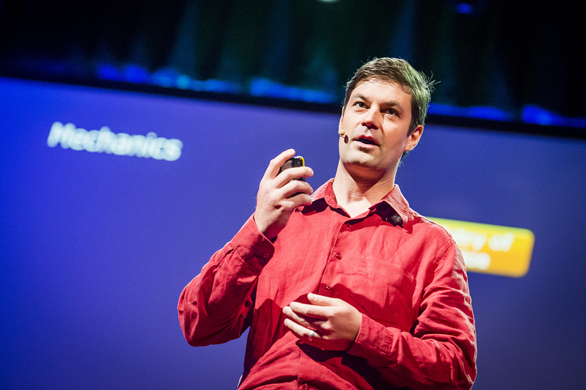
Toby Eccles speaks at TEDGlobal 2013. Here, he shares breaking news. Photo: James Duncan Davidson
Could Social Impact Bonds change the way we tackle social problems?
In a bold talk at TEDGlobal 2013, Toby Eccles shared how a marriage of private and public funds could be a win-win-win for the government, investors and populations in need of innovative social service programs, like those in prison or in the care of the state. In 2010, Eccles’ nonprofit — Social Finance — signed a contract with the UK’s Ministry of Justice to start a pilot program with 3,000 short-term prisoners at Peterborough Prison. If they succeed in lowering the group’s reoffense rate by 10 percent or more, investors stood to make money for every conviction saved.
Early yesterday afternoon, early results were published of the pilot. Though the program won’t finish until 2014, these early results are promising. According to Toby Eccles, whose talk describes launching the Peterborough pilot, the program showed a 23 percent decrease in reoffending rates. (Even though the year before also saw a rise in reoffending rates at large, he is quick to point out.) Justice Secretary Chris Grayling said of the program, it’s “the sort of approach I want to see rolled out to all offenders leaving prison.”
I caught up with Eccles at TEDGlobal to ask him more about his work and these early results.
Congrats on these results. What do these numbers mean for you?
A 23 percent reduction compared to the national baseline are good numbers by any stretch. It’s good news, but we need to be cautious. These are early numbers. This is seen in the national context of the government wanting to implement much wider changes, which are quite controversial. But from an early indication of whether this kind of mechanism can make a difference, it’s obviously tremendous news.
What services do you provide?
We provide a through-the-gate service: We work to meet and form relationships with the prisoners while still in prison. We help assess what their needs are at the time, and connect them to a set of services and elements that they need afterwards. Very often this is a matter of intensive intervention and building a relationship of trust with people who are often very cynical, having had previous services that are patchy or that disappear. So we have a number of prisoners who didn’t engage properly until they went through the system two or three times and realized: We’re not going away.
How do you explain to people what Social Finance’s role in this? How exactly do you make money from this?
We’re the enabler. We raise the business capital and performance manage the organizations doing the work. We also work with services to provide a data-driven way to constantly improve the service. We charge some capital raising fees and a modest management fee. We felt we wanted something that had an element of profit-sharing in it as well, so we get 10 percent of the upside after investors have gotten their capital back.
Who comes up with the proposals for the bonds?
We’re finding ideas coming from all parts: Governments and service-providers. (Investors not so much, though foundations do.) Over the years we’ve also seen the proposed ideas get more sophisticated as people understand the potentials and limitations of the model.
What are your plans for scaling?
With the Peterborough pilot, the MoJ has a great deal of interest in moving a payment-by-result mechanism across the whole of probation, therefore privatizing the whole of probation. That’s a much wider challenge linked to a cost-saving measure that’s part of the austerity package. It’s a complex landscape, and we have to see exactly where that lands to work out what our role, if any, there should be.
Comments (2)
Pingback: Investing private funds for public good: An update from Toby Eccles | BizBox B2B Social Site
Pingback: Investing private funds for public good: An update from Toby Eccles | Best Science News